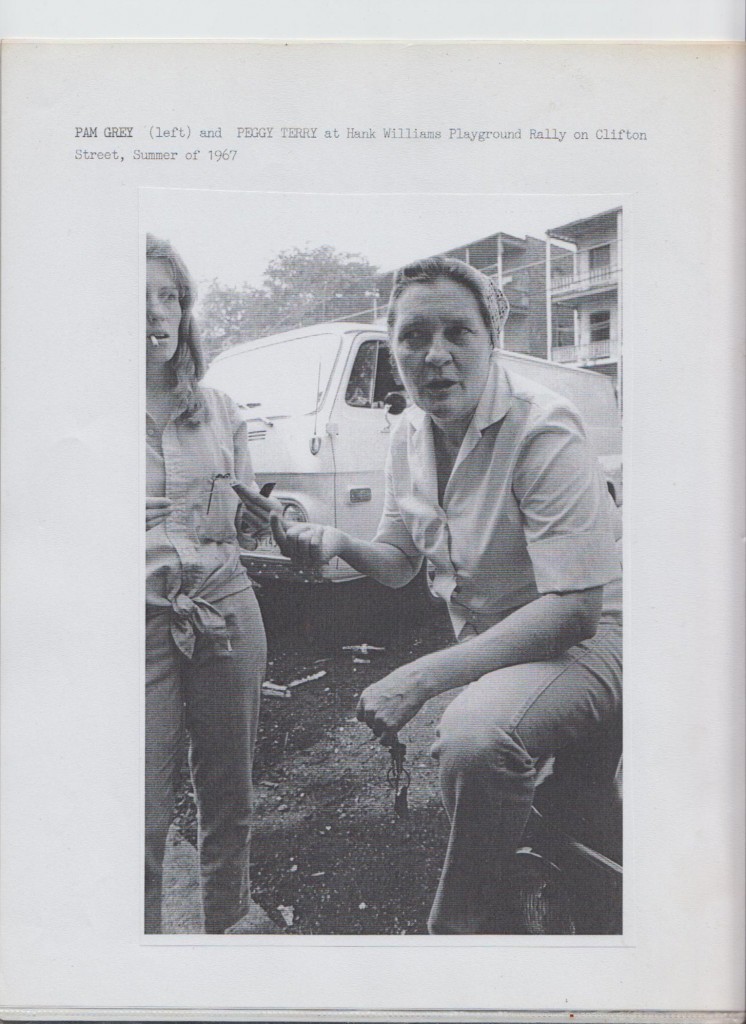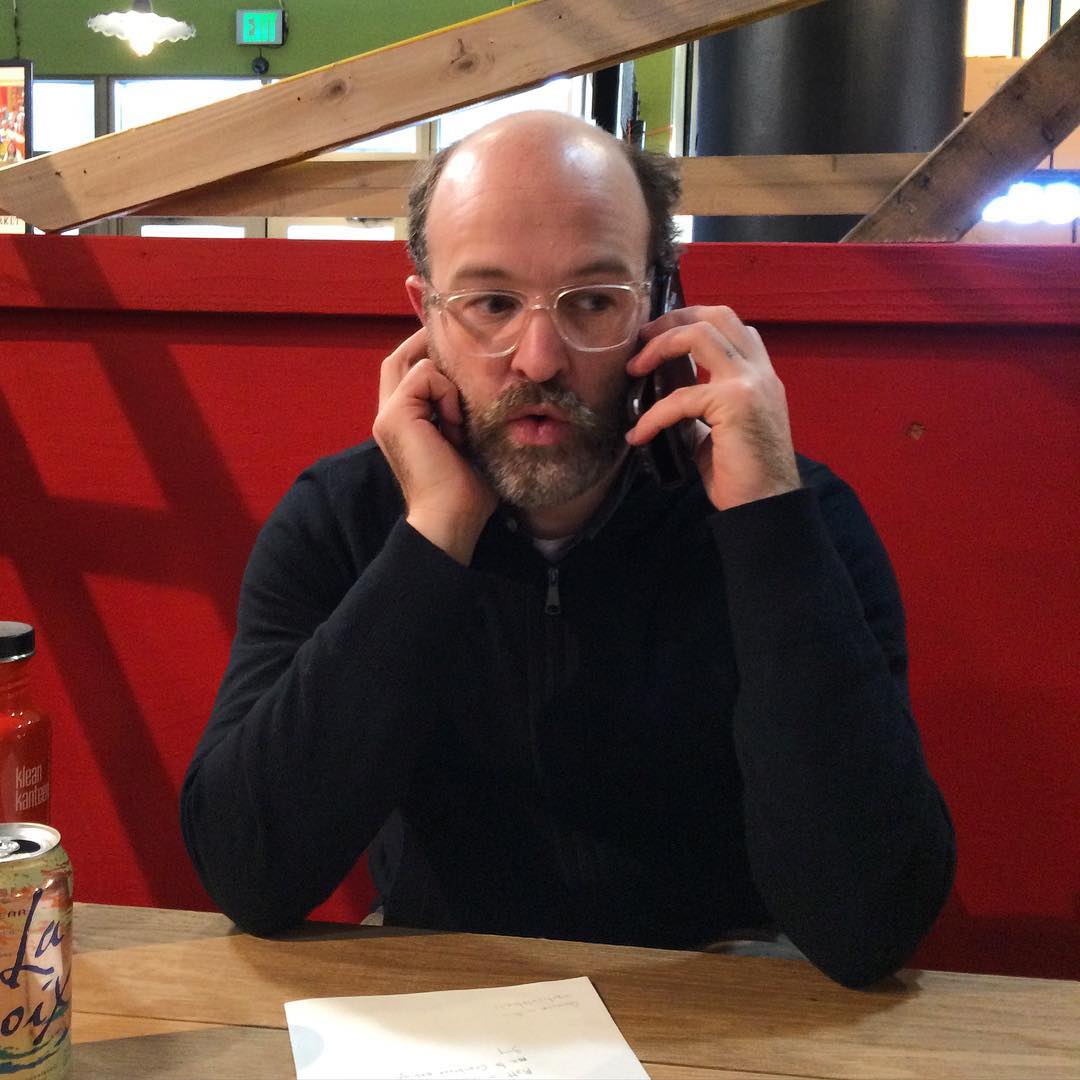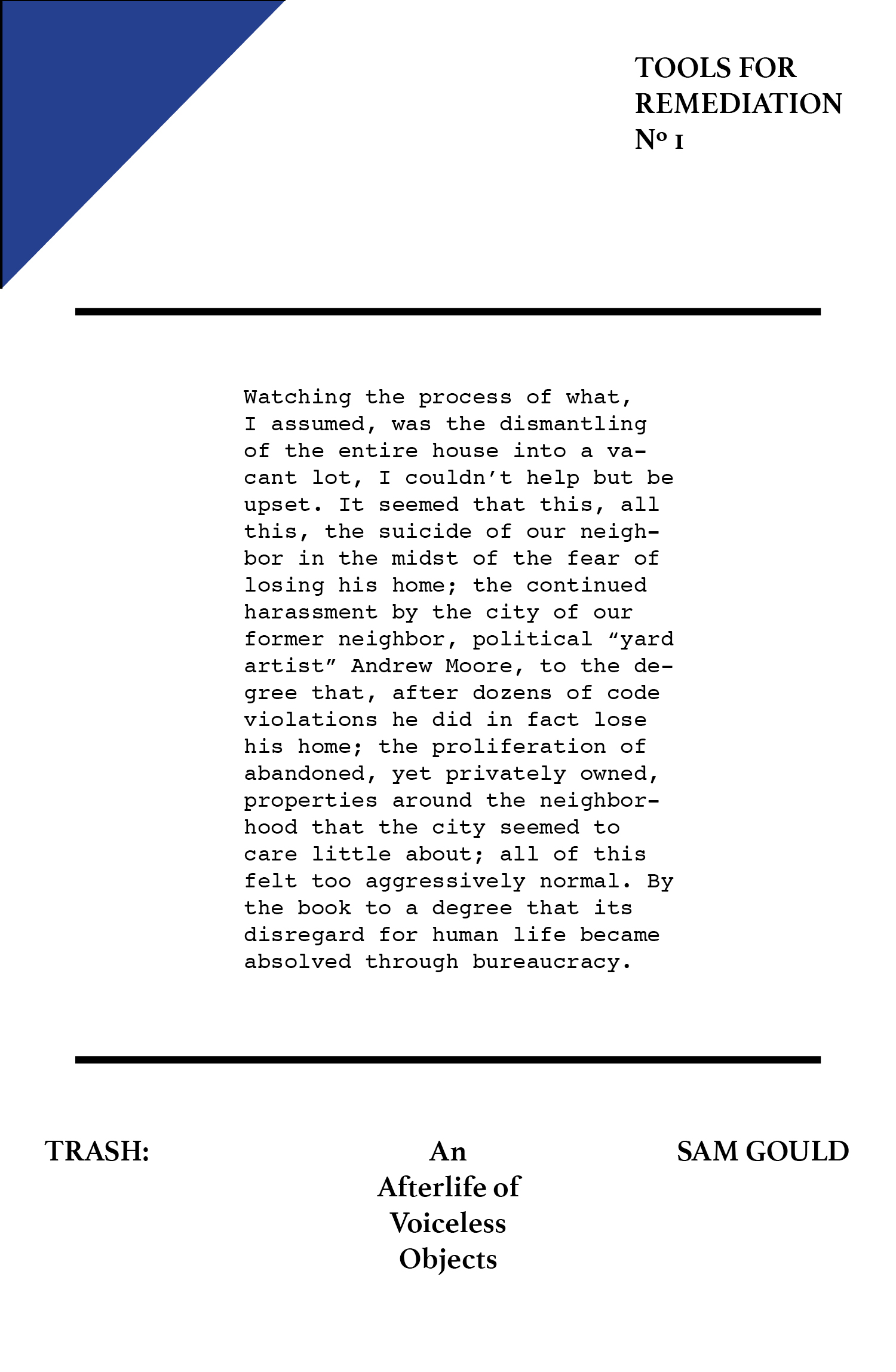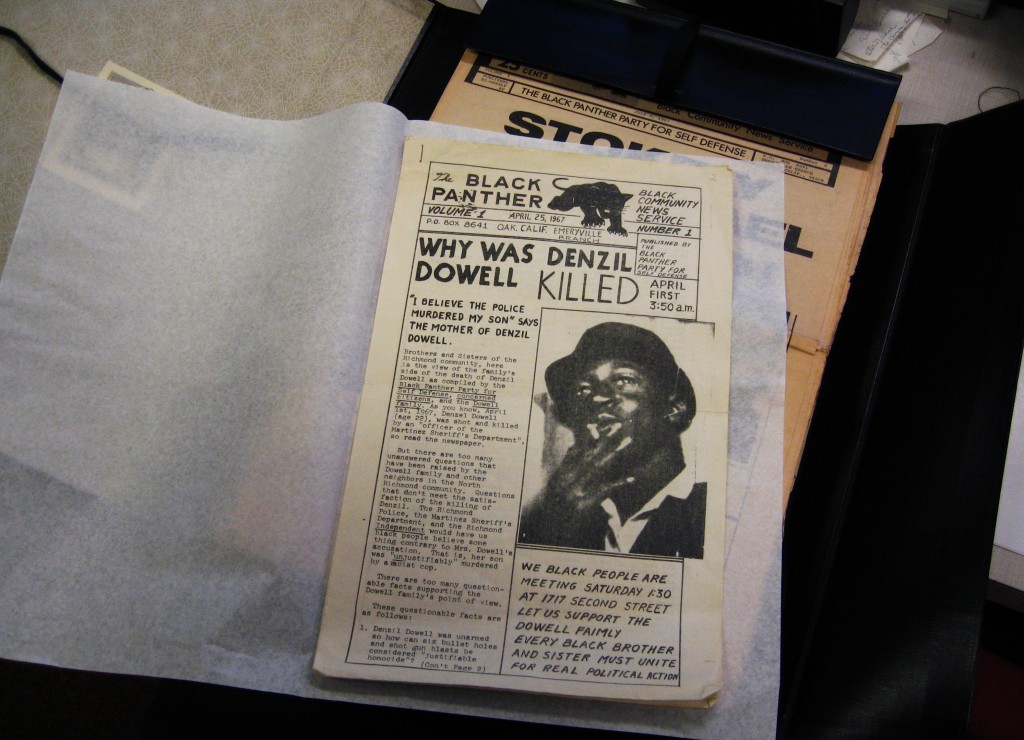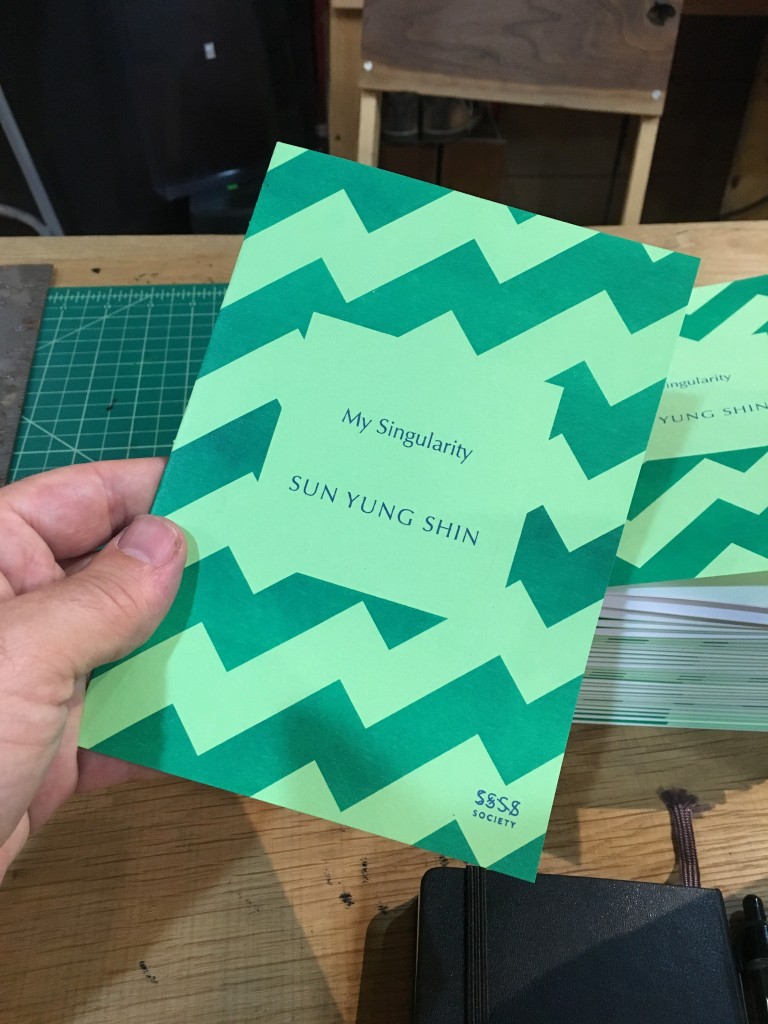
Tonight! The release of My Singularity and Against the Picture – Window: A Time of the Phoenix Compendium at The White Page. Join us!!
Fri, Aug. 26, 2016 ⁄ 7:00–9:00pm
Book Release… Against the Picture – Window: A Time of the Phoenix Compendium & My Singularity
Please join Beyond Repair and Society Editions at The White Page Gallery for the release of Society’s first two publications of poetry at the intersection of political speech: Against the Picture – Window: A Time of the Phoenix Compendium and My Singularity, a new chapbook by Minnesota-based poet, Sun Yung Shin.
Poems will be read. Books will be on offer. Drinks on hand.
————————–
TIME OF THE PHOENIX
Time of the Phoenix was a series of chapbooks produced and circulated around the Uptown area of Chicago and further afield from the late 1960s to the mid-70s, which served as a platform for the urban white poor of the neighborhood. Through poetry and other verse, authors articulate their lives in relation to police abuse, living in poverty, domestic violence, addiction and more. A vehicle for a voiceless population to find voice with one another, Time of the Phoenix was a tactical action in print devised by the Young Patriots—a group of radicalized, young southern white migrants living in Chicago’s Uptown neighborhood. Along with “organizing in their own” through projects such as the chapbook series, the YPO went on to help form the Rainbow Coalition with the Young Lords, and Fred Hampton and the Black Panthers.
Working with founding YPO member, Hy Thurman, Society Editions has published Against the Picture – Window: A Time of the Phoenix Compendium, a collection of original works which appeared in Time of the Phoenix, as well as original photographic documents, interviews, commentary, and contemporary poetic works which speak across history and experience to the voices which originally appeared in the chapbook series.
MY SINGULARITY
My Singularity brilliantly graphs the myth of Pinocchio onto the contemporary flux of human identity amid advances in artificial intelligence and the human genome project, crafting a deeply felt extended metaphor for the physical body as site of meaning, a screen onto which multiple stories are at all times being projected. Sun Yung Shin’s intelligence and empathetic reach appear infinite as she imbues a wooden puppet with the kind of pathos we normally reserve for ourselves. The poem demonstrates an ethos at work typified by W.B. Yeats’s claim that “the quarrels we have with others are rhetoric / The quarrels we have with ourselves is poetry.” Allowing the latter to show itself is no small feat in a political climate that engenders discord and factionalism at every turn. Her poem searches the identity of the orphan, the manufactured psyche, the worker, and locates the vulnerable body of the nation-state as it exists as a living, breathing organism.
My Singularity is a single poem published as a chapbook by Society Editions.
SOCIETY EDITIONS
Society is a construction, dismantled and reformed daily, yearly, through our perceptions and public pronouncements, either shouted or whispered. As an expandable publishing platform, Society concerns itself with the intersection where poetry meets speech and where private and public life collide. Society is timely and agile, responsive and responsible, paper and air.
If poetry can act as an ethical barometer of a population in time, Society changes with you and you change Society. Society is a response and then a record.
As an imprint, through a yearly almanac, individual books, chaplets, posters, actions, programs, et al, Society aims to pick away and uncover the role and possibilities of poetry as public speech, how abstract, or seemingly obtuse, texts can engage and decipher very real and timely issues around public life and power.
Society Editions is co-edited by Mary Austin Speaker, Chris Martin, and Sam Gould
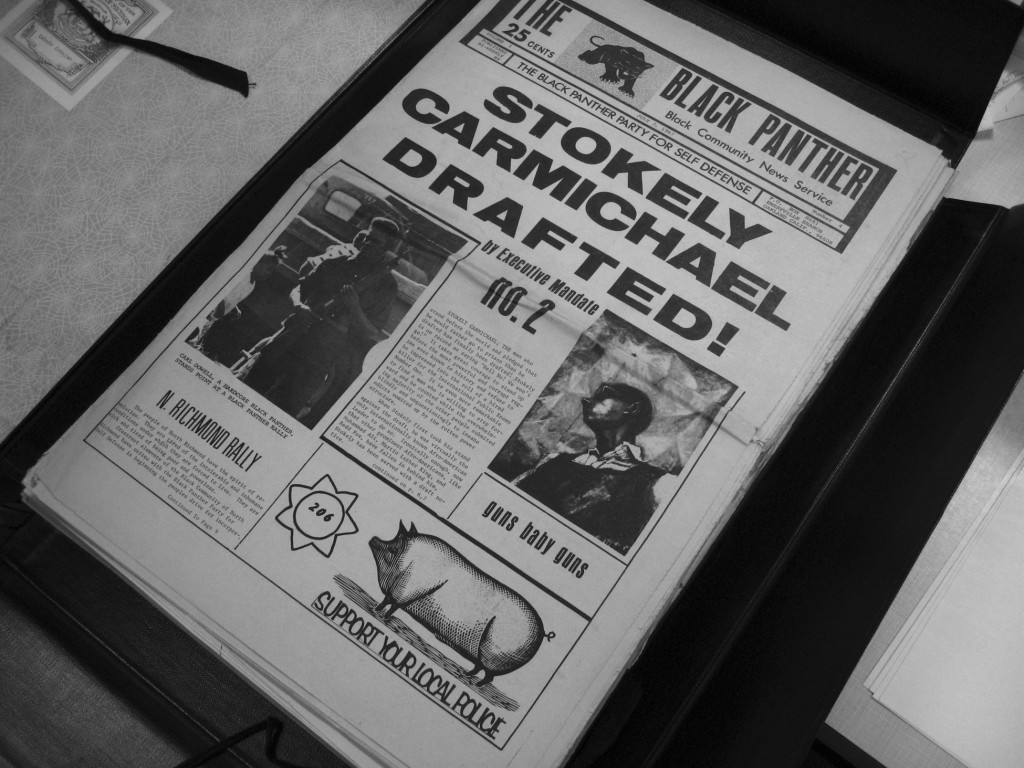
Almost here… the first edition of Publics and Publication Nº1; Emory Douglas. Rumor has it that our neighbor, Marlon James, is going to write the forward to it as well!
Here’s a bit of a primer to Emory’s genius.
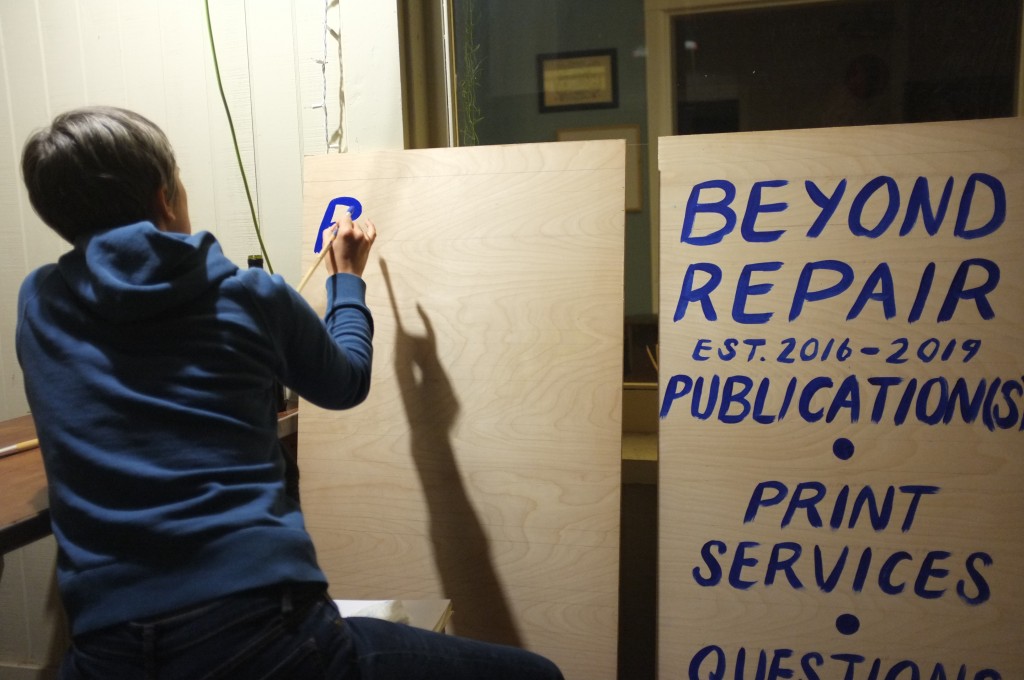
Our old friend, Helena Keeffe, came into town the other day to celebrate May Day and, simply, hang out. I first met Helena, and her then boyfriend, now husband, Joseph Del Pesco here in Minneapolis when Laura and I were visiting Laura’s family way back in 2001. At the time Joseph was the curator at the Soap Factory here in MPLS.
A few years later Helena and Joseph moved out to San Francisco so that he could start attending the curatorial grad program at California College of the Arts. Not long after that I started teaching at CCA in the newly formed graduate department for Social Practice. As I was still living in Portland I’d fly down for the times I taught and Joseph and Helena were always around, knocking on the window of our friend Jen Rhoads’s house – their neighbor who I’d introduced them too – asking if I wanted to go down the road to get a breakfast burrito at our favorite West Oakland taco truck. All said, we’ve always kept in touch, experienced one another’s ideas and projects in various states both at home and out in the world.
When Helena was in town it made me think, “Oh, can you paint the shops sign?” Of course she said yes. I knew I couldn’t do it as I hate looking at my hand-writing all day. So, I cooked dinner for her and Laura and the kids while Helena sketched out the measurements for the lettering. After the family went to bed we stayed up as Helena painted our new signs and we talked into the night.
I bring all of this up as it represents exactly the type of work and exchange that form around affectionate relationships – you don’t think of it as work, and you certainly don’t feel you are “giving something away” through the exchange. It’s people coming together to make one another’s lives happier, easier, and more appealing. When I say “affectionate” I mean both kindness and care and love, but I also mean “affect,” the way that all of those qualities change you when you allow people and the world to make you who you are, when you allow yourself to be changed through proximity to others.
All of this could seem slight, and in some ways – quite wonderfully – it is. When it gets to the point that it is reflexive and organic, mundanity can seem like symbiosis. When considered more deeply, even these small moments – making a sign for a friend, cooking for one another; a simple exchange of skills and values – can seem, and be, mutual aid as Kropotkin thought of it, or like Morris’s ideas of fellowship.
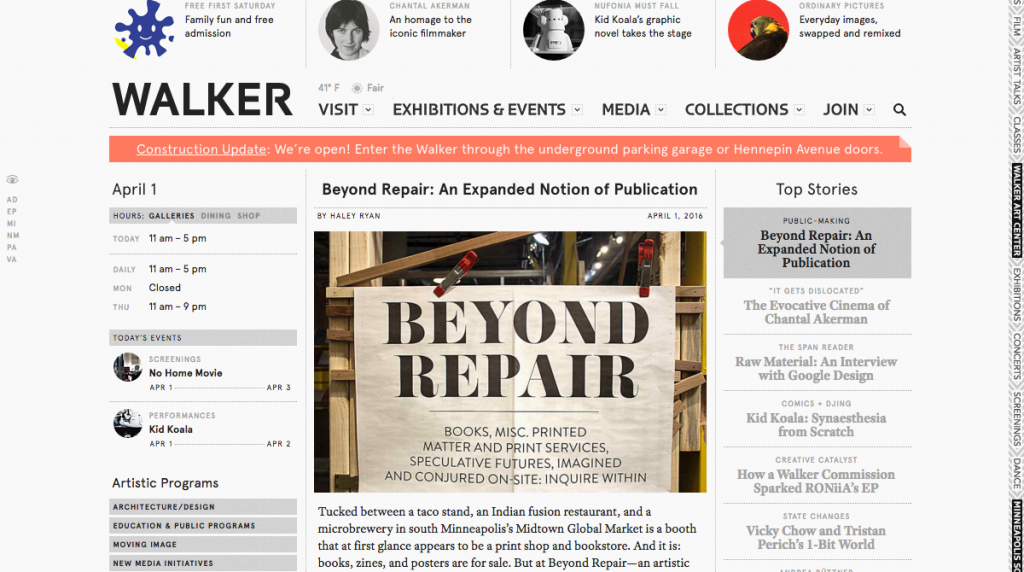
The Walker Art Center just published this really great piece about the shop and the theories and interests of the project in full. Check it out.
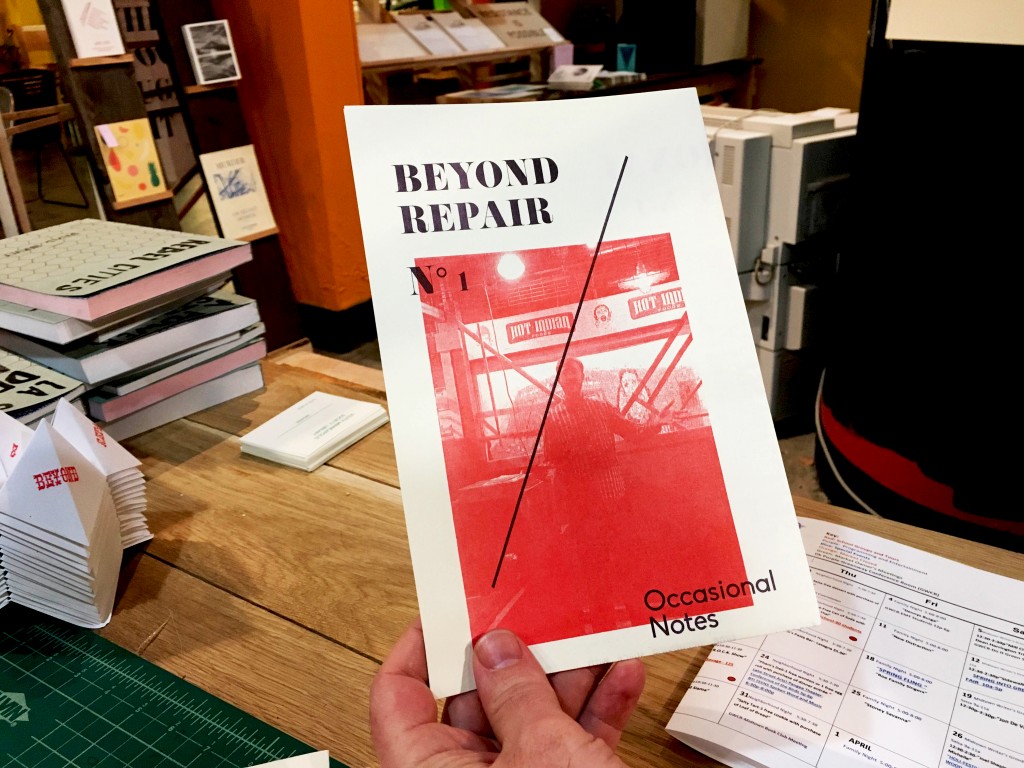
As a way to move more complex reflections around the neighborhood, both on and offline, we’ll be producing a series of broadsheets, intermittently produced, that reflect both our own experiences facilitating the space and assisting the ideas and interests of those who step into it, as well as making light of urgent ideas and actions within the neighborhood on a whole.
Free, as it should be – these are communiques after all – Occasional Notes Nº1 is currently available within the shop to take, read, and distribute as you wish, dropped off throughout the neighborhood, and posted here on the site, to read on whatever device you are currently tuned into. Enjoy.
“Beyond Repair provides value that can’t be quantified or qualified with capital or numbers. It is wildly human. A project like Beyond Repair offers far more than a storefront for enlightened consumerism; it cracks the framework of profit and measurable “success” to allow experiences, conversations, stories, people’s real feelings and emotions, a chance to slip through, to be experienced by an extended community in authentic, unpredictable ways.”
Watching the process of what, I assumed, was the dismantling of the entire house into a vacant lot, I couldn’t help but be upset. It seemed that this, all this, the suicide of our neighbor in the midst of the fear of losing his home; the continued harassment by the city of our former neighbor, political “yard artist” Andrew Moore, to the degree that, after dozens of code violations he did in fact lose his home; the proliferation of abandoned, yet privately owned, properties around the neighborhood that the city seemed to care little about; all of this felt too aggressively normal. By the book to a degree that its disregard for human life became absolved through bureaucracy.”
– from Trash: An Afterlife of Voiceless Objects by Sam Gould (coming soon in the Tools for Remediation booklet series)
Sitting in the shop and thinking about the various ways that Beyond Repair, as a project and not simply a site, needs to utilize publication to move ideas around a neighborhood. For one, when thinking about publication, it’s important to be light on your feet.
Publication, within these circumstances can be both object and / or action, noun and / or verb. Publication acts as the tool to move ideas around. This could mean a book, a zine, a parade, or a protest.
Lasting publications serve the publics they wish to energize and purposely avoid formalism for the sake of promoting agency.
THE MASKS ARE FOR OUR OWN SAFETY
Chris Martin
Duct-taping the mouth of the oracle shut
Finance doesn’t need a body
It needs everybody
Bed bugs leisurely fleecing
A handwritten note reading free
As Hurricane Patricia scalps the coast
I say tomorrow, you say opportunity
(everything’s a mouth)
I say opportunity, you say property
As we (endless
Dolly shot) glide across the sidewalks
I want to fondle each tree
Marked with a green x
Because, I dunno, they’re possessed?
Our red carpet of papier-mâché leaves
Turns into one big banana peel
In the freezing autumn rain
This week we’re fucking and making a baby
Giving the cat away so I can breathe again
There’s a twitch in the translucent
Hood of my left eyelid
Tapping out Morse code to the half-buried scarecrow
It’s almost Halloween
Scarlet sociopath gardens
Blooming their scattered limbs
In manicured yards
I thought these people were middle class liberals
Bill Blass, Ralph Lauren
Atty is waging a nap-strike
Singing horn bill horn, his pants are all torn
And then mi cabeza over and over
He’s two-and-a-half and he’s going to be
A sexy, sparkly witch
And there’s nothing we can or want
To do about it
He’s the future
The future prolongs his opulent sleeplessness
And I secretly want him to become an engineer
But he’ll probably just become a famous actor
Or worse, a poet
The future is making declarations and practicing her cackle
I need the future to sleep so I can relax
But the future really doesn’t get tranquility
I should just let the future finish this poem
He says Daddy feels the beautiful rain
He says It’s nighttime in other people’s houses
He says I breathe my dark air
He says I become a merry, scary shepherdess
He says Yellow fire, yellow fire
He says I’m going to shrink to the size of an acorn
He says The white astronaut on the white moon opens the white door
He says Petal shovel
He says My astronaut got some moon on him
He says Mama is a witch because she walks in the alley
He says Daddy is a man because he walks into a house and is not a thing
He says Orca in a carriage full of people
He says I’m bellying away from you
He says You don’t want to call it anything
(from Rad Dads)
Hey, look who showed up to sing for Emory Douglas after his conversation with Sam Gould and Chaun Webster at the shop the other night.
Million Artist Movement Sings for Emory Douglas from Sam Gould on Vimeo.
Grateful for Hope Hilton sending along this bell hooks quote to us:
“The first time that I got to be with Thich Nhat Hanh, I had just been longing to meet him. I was like, I’m going to meet this incredibly holy man. On the day that I was going to him, every step of the way I felt that I was encountering some kind of racism or sexism. When I got to him, the first thing out of my mouth was, “I am so angry!” And he, of course, Mr. Calm himself, Mr. Peace, said, “Well, you know, hold on to your anger, and use it as compost for your garden.” And I thought, “Yes, yes, I can do that!” I tell that story to people all the time. I was telling him about the struggles I was having with my male partner at the time and he said, “It is O.K. to say I want to kill you, but then you need to step back from that, and remember what brought you to this person in the first place.” And I think that if we think of anger as compost, we think of it as energy that can be recycled in the direction of our good. It is an empowering force. If we don’t think about it that way, it becomes a debilitating and destructive force.”
Sat, Dec. 19, 2015 ⁄ 4:00–6:30pm
Rad Dads: Local Writers on Fatherhood and the Radical Domestic

In celebration of Chris Martin (Poet / Co-Editor of Society) and his new book of poems, The Falling Down Dance (Coffeehouse Press) we invite you to join the authors below for a pint just down the way from the shop at Eastlake Craft Brewing, for a reading and conversation about verse and fatherhood. Readers will include:
Sam Gould
Steve Healey
Chris Martin
William Waltz
Patrick Werle
Clarence White
We’ve produced a chapbook for the occasion, entitled of course, Rad Dads. It’s cheap. Like $5.
Sun, Dec. 13, 2015 ⁄ 4:30–5:30pm
Publics and Publication: A Conversation with Emory Douglas
As part of an intermittent series of conversations taking place at Beyond Repair entitled Publics and Publication, Emory Douglas (artist and former Minister of Culture for The Black Panther Party) and Sam Gould (Editor of Red76) will discuss the role of the BPP’s newspaper, The Black Panther, as not simply a fixed object existing to move information along, but a very specific device to form a public around the desires and ideals of the Black Panther Party and its orbit.
The conversation will touch on both the practical elements of putting out the paper, but equally as much the theoretical role and value of The Black Panther and how it served as a tool to illustrate distance between individuals, a device that opened up a space of questioning for the reader, pragmatically, within their day. Inasmuch The Black Panther was both a physical object, allowed to travel relatively freely within the world, but just as much a subject, a tool for public-making afforded a nature as complex as its readership.
